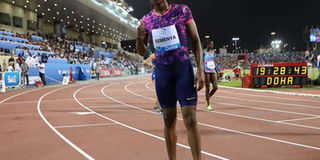Caster Semenya 'philosophical' on new IAAF rules, AK happy

South Africa's Caster Semenya gives the thumbs up after winning the women's 800 metres during the Diamond League athletics competition at the Suhaim bin Hamad Stadium in Doha, on May 5, 2017. PHOTO | KARIM JAAFAR |
What you need to know:
- “I’m 97% sure you don’t like me, but I’m 100% sure I don’t care,” she said in one tweet, complete with a frowning emoji.
- “How beautiful is it to remain silent when someone expects you to be enraged,” she posted in another.
Athletics Kenya (AK) has welcomed new rules announced Thursday by the world athletics governing body that seek to create a level playing field in women’s track competition.
AK president Jack Tuwei termed the rules as a good relief.
"We are happy that this issue has finally been concluded and direction given," Tuwei said.
"We fully support these rule changes."
AK’s women’s representative Milcah Chemos said the rules, which limit the levels of male hormones in female athletes, will apply across the board and are not meant to target specific athletes, for instance South Africa’s controversial multiple world, Commonwealth and Olympic champion Caster Semenya.
“The rules will affect those who could be having the same problems as Semenya,” Chemos, a former world steeplechase champion said.
“It’s only fair to have each athlete compete on an equal footing. It's good for the sport,” added Chemos who is the athletes’ representative in AK.
Semenya herself has steered clear of the debate following the publication of the new rules Thursday morning, but unleashed philosophical tweets on her official handle.
“I’m 97% sure you don’t like me, but I’m 100% sure I don’t care,” she said in one tweet, complete with a frowning emoji.
“How beautiful is it to remain silent when someone expects you to be enraged,” she posted in another.
The Athletics South Africa Association (ASA) also weighed in on the matter releasing a statement on Thursday saying that it was standing by its athletes 'who may be affected by this new ruling'.
"As a federation, we will study the new regulations and compare them with the CAS recommendations to see if they are compatible and in line. Once done, we will then interact with the IAAF," read part of the statement.
Semenya fans didn’t take the new rules kindly, criticizing the IAAF’s decision.
"I find it odd that Semenya is considered to be having some kind of advantage but (Zola) Budd ran faster and she didn't even have shoes! It seems to be dreadfully unfair to pick on Caster this way,” RSA.MommaCyndi, reacted an online article by South Africa’s The Sowetan on the new rules.
“The whole purpose of competitive sport is to be above 'average'. Genetic muscle-fibre structure also gives an advantage over 'average' humans but it would be insane to ban the Kenyans just for being better than 'average'!”
But Teofli was more humorous: “I have more testosterone and can still be outran by many girls and women.”
Literally Mario argued: “This has nothing to do with the colour of her skin, this is a debate on what to do with intersexed athletes, who have 3 times as much testosterone as normal women.
“There is a reason testosterone is banned, it gives a significant advantage if levels are high. This makes it a difficult decision. Do we allow 'natural' intersexed athletes to compete with their advantage, or do we level the playing field?”





